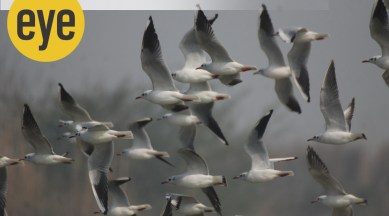Are you a ‘specialist’ or a ‘generalist’?
Animals, birds, plants, even humans, come under these two categories, based on the food they eat. Being a fussy eater can therefore be dangerous, says Ranjit Lal

Some animals and even plants are real prima-donnas when it comes to what they eat and where they live and what the climate should be like if they are to survive. At the other extreme are those which don’t really give a damn: they’d try anything, adapt to any environment and tolerate hideous living conditions. Scientists have divided them into “specialists” and “generalists”. Of course, there are many middle-of-the-roaders that slot between these two extremes, but let’s meet a few of the real fusspots and few of who are willing to put just about anything into their mouths and doss down anywhere.
Anyone who has ever tried to rear caterpillars in the hope of them eventually turning into chrysalises and then butterflies will know that the caterpillars will binge like gluttons, but only on their particular brand of food. Offer them something else and they will rather starve to death than take a nibble. There are many other such fusspots in nature — by and large, herbivores tend to be specialists though there are many who break convention.
Among the fussiest is the giant panda — who wants bamboo for breakfast, lunch and dinner and any snacks in between, and who gets 95 per cent of its intake from bamboo. Another famous example is Australia’s koala, which has a thing for eucalyptus leaves and nothing else. Eucalyptus leaves are poisonous and shunned by all other herbivores except the koala, whose tummy does not get upset by them, and so it has the whole eucalyptus buffet all to itself, carving an ecological niche for itself.
Now eucalyptus leaves would probably not appreciate being eaten — even if it were by a cuddly animal — and, so, would be working towards strengthening its poisons, just as the koala would be working at negating even this, thus setting off a kind of arms race between the two. This, in fact, is how new species evolve — as they get more and more specialised in order to survive. While carnivores generally tend to help themselves to any kind of meat (including rotting), the fastidious Canadian lynx will only want snowshoe hares to be served at its table.
Of course, there is a dangerous downside to this: Take away the bamboo and where would that leave the giant panda? Well on the road to extinction. If eucalyptus were to suddenly die out, so would the koala. They simply would not have enough time to adjust to another diet. That’s why many zoos have hell of a problem feeding stubborn exotic creatures who demand designer food and nothing else. Fussy eaters will need larger territories than non-fussy eaters, because only so much of their favorite food can grow in a particular patch. But it’s a frightening dependency and is not confined only to khaana-peena!
Many species of plants depend on particular species of insects to pollinate them. The grand banyan tree — a keystone species in the tropical forest — has its own species of wasp, less than one millimetre long, which does this job. If this wasp were to go extinct (say by reckless use of pesticides), the grand banyan would fall and in doing so, eventually bring the entire forest down with it.
Being fussy can be dangerous but it has led to the evolution of our bewildering and astonishing biodiversity, with enough space for all.
At the other end of the spectrum are the “generalists”. These would include such lovelies as cockroaches, rats, goats, horseshoe crabs and, of course, ourselves. Our kind can eat anything, live anywhere in any kind of climate — we “adjust”. Horseshoe crabs, which evolved some 360 million years ago, have an extensive variety in their diet and can tolerate a wide range of water temperature not to mention low oxygen levels, too. Some specialists also seem to be changing their colour: gulls were supposed to be sea-going fish-eaters but now throng garbage dumps and fight over offerings of namkeen. Bears in Alaska, traditionally living off salmon, berries, roots and honey have now discovered the joys of fast food in suburban garbage bins especially since their wild territories are increasingly encroached upon. And some “generalists” like ourselves have specialised too! The Inuit can live virtually only on meat, fish and blubber with a little seaweed and berries on the side.
Thanks to their eclectic nature, generalists tend to have larger populations than specialists and are less in danger of going extinct. Overpopulation is more their problem. I guess the best compromise — and means of survival — would be not to throw a hissy fit if your favourite dish were not available — but accept what is with good grace.